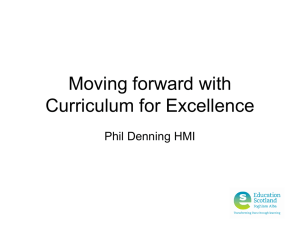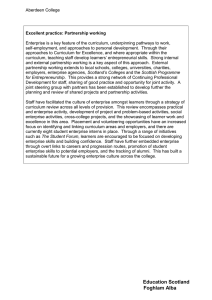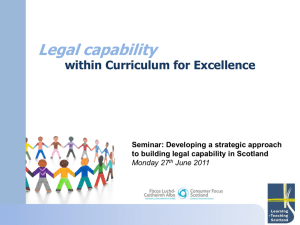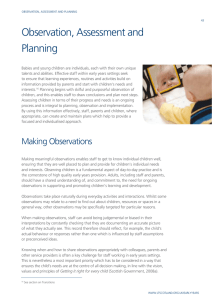Financial Education Developing skills for learning, life and work 2010 www.LTScotland.org.uk
advertisement
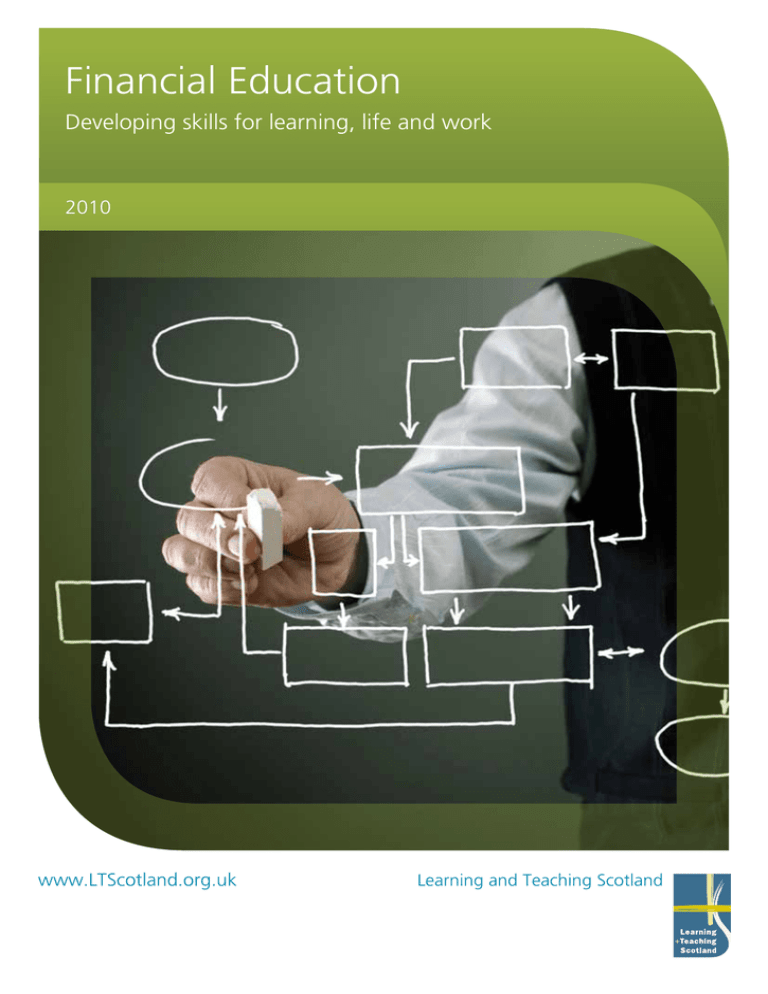
Financial Education Developing skills for learning, life and work 2010 www.LTScotland.org.uk Learning and Teaching Scotland ISBN: 978-184399-187-8 © Learning and Teaching Scotland 2010 3 Contents Ministerial Foreword 5 Introduction 7 Vision and Rationale Development of Financial Capability and Curriculum for Excellence 9 10 Learning and Teaching 12 Planning15 Working with Partners 16 Inclusion and Equality 17 Continuing Professional Development 18 Support for Staff 20 Conclusion21 www.LTScotland.org.uk 4 FINANCIAL EDUCATION – DEVELOPING SKILLS FOR learning, LIFE and work ministerial foreword Ministerial Foreword The need for high quality financial education for young people in Scottish society has never been greater. Scotland already has an enviable track record of supporting financial capability with partnership working right across the financial, education and cultural sectors. This cross-sectoral effort has been recognised as good practice from both within the UK and beyond. As we see Curriculum for Excellence being implemented throughout Scotland, a fresh opportunity has arisen to enable that practice to be part of learning across the curriculum. This will keep the momentum for improvement going, and ensure that the benefits achieved to date are built on as the economic climate becomes more challenging. The principles outlined in this document will mean that schools will be well equipped to provide young people with the information and tools they will need to learn from an early age about keeping track of their finances and making ends meet. They will be able to learn about how to use credit appropriately, which itself can reduce the stresses and uncertainties that can arise when money is less well managed. In addition, good financial management can increase the capacity of young people to understand how best to go about saving for the future. This document aims to further enhance the status and profile of financial education as an integral part of Curriculum for Excellence. Schools and centres need to be free to make their own judgements about how and where to use the development of financial capability as a context for learning within the curriculum. Our research evidence suggests that the confidence of teachers in dealing with financial education needs more support. Learning and Teaching Scotland and thereafter the Scottish Education Quality and Improvement Agency will I am sure continue to work with stakeholders to support teachers and learners. In particular, the use of Glow – the Scottish educational intranet – will provide an important tool to help develop effective practice in schools across the country. I am grateful to all of those organisations who already support schools in their task of delivering financial education and I hope that this essential work is continued for the longer term benefit of both the young people and wider society. Michael Russell Cabinet Secretary for Education and Lifelong Learning www.LTScotland.org.uk 5 6 FINANCIAL EDUCATION – DEVELOPING SKILLS FOR learning, LIFE and work introduction Introduction Excellent financial education is already happening in many schools and centres in Scotland. Motivating materials and exciting approaches have been developed which have made it relevant to learners of all abilities and interests. This document provides guidance on how financial education can be embedded within the framework of Curriculum for Excellence. It takes account of current research and identifies the key issues regarding learning and teaching and how teachers and educators can best be supported to ensure a quality experience for children and young people. Together with Managing Momentum which is aimed at the financial sector and other partners, it forms the delivery plan that will drive forward financial education improvements. Changing economic, political, social, and environmental contexts continue to have a dramatic and wide-reaching impact on all our lives. With this as background it is essential that everyone develops a broadly based financial capability to deal with the financial challenges that lie ahead. Curriculum for Excellence establishes financial education as an integral part of numeracy across learning. It offers an interdisciplinary1 context for learning which children and young people find highly relevant and it gives opportunities for staff to work together to develop, reinforce and extend learning in numeracy. Developing financial skills not only benefits individuals but also supports the Scottish Government to achieve its strategic objectives in ‘creating a more successful country’: Wealthier and Fairer – People increase their wealth by managing their finances better and by developing their financial capability they improve their employability. Business benefits from having an enterprising and financially skilled workforce. Smarter – Financial education enables our children and young people to gain the skills they require as individuals and to contribute to the wider economy. It gives them the confidence and ability to continue to learn the financial and other essential skills which are critical to work and later life. Healthier – Lack of good financial management is linked with lower reported life satisfaction, higher mental stress, and health problems associated with anxiety or depression. Improving financial capability should therefore enhance the mental and emotional wellbeing of most people. Safer and Stronger – Developing financial capability in our children and young people gives them better opportunities and leads to a better quality of life. They are also able to contribute more effectively to their communities. 1www.LTScotland.org.uk/resources/i/genericresource_tcm4620621.asp?strReferringChannel=searchandstrReferringPag eID=tcm:4-615801-64 www.LTScotland.org.uk 7 8 INTRODUCTION Greener – Financial education develops responsible citizens who can consider the impact of financial decisions on their environment and who are concerned about the sustainable use of resources in their immediate and wider communities. Learning and Teaching Scotland has identified four key aspects of financial capability: Developing financial understanding is the first step in ensuring that young people leaving school have the skills required to deal confidently with everyday financial issues. It will also help them to make informed decisions and choices about their personal finances. Financial competence means being able to apply knowledge and understanding of financial matters across a range of contexts, using ICT where appropriate. Being financially competent includes being able to identify and tackle problems or issues with confidence and being able to manage financial situations effectively and efficiently. Financial responsibility means having a caring and responsible attitude with regard to the use of resources. Children and young people who budget wisely and plan for the future have a better chance of becoming responsible citizens who look after themselves and their environment. Financial enterprise is about being able to deploy resources in an imaginative and confident way. It will involve children and young people making informed spending and saving decisions as well as being creative and innovative in diverse personal, business and economic situations. These four aspects provide an outline of excellent financial education. They are described in more detail in the statement of position on financial education in Scottish schools.2 Although most children and young people experience their financial education in schools and centres, a significant number continue to do so in less formal settings and in the college sector. In addition, community learning and development agencies also play a part in delivering financial education to children and young people, particularly to those at risk of financial exclusion. This document provides guidance on how financial education can be embedded within the framework of Curriculum for Excellence. It takes account of current research and identifies the key issues regarding learning and teaching and how teachers and educators can best be supported to ensure a quality experience for children and young people. Developments in financial education are supported through Glow and the Learning and Teaching Scotland website. These online resources provide support for all those involved in financial education and provide a rich source of help and advice. The online PDF version of this document has embedded links to sections of further guidance available at the online resources. 2 Scottish Consultative Council on the Curriculum (1999) Financial Education in Scottish Schools: A Statement of Position FINANCIAL EDUCATION – DEVELOPING SKILLS FOR learning, LIFE and work vision and rationale Vision and Rationale Vision Our vision for financial education in Scotland is that: • all children and young people develop the key financial skills to be successful both now and in the future • financial education is embedded in Curriculum for Excellence as part of numeracy across learning and that it provides a relevant context to develop skills for learning, life and work • it helps children and young people to develop the four capacities of Curriculum for Excellence, particularly in becoming responsible citizens and effective contributors to society. Rationale Curriculum for Excellence is designed to transform education in Scotland, leading to better outcomes for all children and young people. It does this by providing them with the knowledge, skills and attributes they need to thrive in a modern society and economy, laying the foundation for the development of skills throughout an individual’s life. The philosophy and practice underpinning Curriculum for Excellence offers many opportunities for children and young people to experience financial education. Financial education will provide a relevant context to develop knowledgeable, skilful and enterprising children and young people who can take increasing responsibility for their own lives and plan for their future. Managing money is one of the most important and challenging features of everyday living. We all need to: • understand key financial and economic ideas • be skilled in managing our financial affairs • recognise the importance of using financial resources responsibly • be able to operate in a confident and enterprising manner. www.LTScotland.org.uk 9 10 DEVELOPMENT OF FINANCIAL CAPABILITY AND CURRICULUM FOR EXCELLENCE Development of Financial Capability and Curriculum for Excellence Financial education is a planned programme of learning and teaching that develops the financial capability of all learners so that they have the key financial skills to be successful now and in the future. It is embedded within Curriculum for Excellence and reflects the key principles of curriculum design3. Financial capability can be developed in a variety of ways so that learners experience challenge and enjoyment while developing their skills for learning, life and work. Much financial education will continue to be curriculum or subject based, particularly in the areas of mathematics, health and wellbeing, and social studies. Financial education offers a relevant context that will interest and motivate children and young people. It enriches learning and teaching in these curriculum areas and subjects. Financial education also offers the opportunity to take learning beyond subject boundaries, allowing learners to make connections across different areas of learning. Examples of learning opportunities across the curriculum include: interpreting a chart or table to identify the best savings account, considering the impact of ‘fair trade’ arrangements on poor farming communities, or looking at the language used in an advert to promote a financial product. Projects and theme days in a financial setting can be very successful. There are many opportunities in the life and work of a school to develop the financial skills of children and young people. Activities such as charity fundraising, running a school shop and managing a budget for a school event are all experiences that improve the financial capability of our children and young people while at the same time giving them responsibility, 3 Scottish Government (2008) Building the Curriculum 3 – A framework for learning and teaching FINANCIAL EDUCATION – DEVELOPING SKILLS FOR learning, LIFE and work ‘Setting up and running a school credit union savings scheme and learning about the work of the World Council of Credit Unions has provided our young people with stimulating active learning experiences, and opportunities to make connections across learning. This is having a positive impact on community learning and development, while giving our learners the opportunity to develop as financially aware, responsible global citizens.’ Faculty Head, Language and Communication Adding up to a Lifetime (AUTAL) is a resource produced by the Specialist Schools and Academies Trust, supported by Prudential and Learning and Teaching Scotland. ‘Our school is in the process of embedding it (AUTAL) across the curriculum. The RME department has included the wedding section in its ‘Relationships’ unit and the Mathematics department has used it to enhance the teaching of percentages and salaries. Pupil evaluations indicate that they appreciate the use of different teaching styles in presenting the content in a variety of ways.’ Depute Headteacher DEVELOPMENT OF FINANCIAL CAPABILITY AND CURRICULUM FOR EXCELLENCE building their confidence, and providing the opportunity for personal achievement. In the senior phase, learners will have the opportunity to gain qualifications for their achievement in financial education. For example, the Scottish Qualifications Authority (SQA), in partnership with the Institute of Financial Services, offers the Foundation Certificate in Personal Finance at National Qualifications (SCQF level 4). SQA is currently reviewing its qualifications and arrangements to further support the development of financial capability in schools and educational establishments in Scotland. Further issues to be considered in planning financial education are the establishment of clear links to aspects of the school’s provision for ‘enterprise in education’ which includes all aspects of ‘work related’ learning, particularly work experience and careers education. Due account should be taken of local circumstances and of opportunities for using partners or education and work links to enhance financial learning. Reflective question In the context of embedding financial education in the curriculum, to what extent do we make use of the full scope of the curriculum, including the ethos and life of the school as a community? www.LTScotland.org.uk 11 12 LEARNING AND TEACHING Learning and Teaching Good financial education provides opportunities to extend beyond subjects and curriculum areas to include: • the ethos and life of the school as a community • interdisciplinary projects and studies • opportunities for personal achievement. To ensure coherent planning, delivery and development in the context of Curriculum for Excellence, financial education should be embedded within numeracy across learning4. Numeracy is a skill for learning, life and work that enables us to use number to solve problems, analyse information and make informed decisions based on calculations, being aware of resulting consequences. Schools and centres can use financial education to develop activities which are relevant to everyday life and take place across a range of curriculum and subject areas. Active and co-operative learning styles are often used to develop financial capability and this can be very important in reflecting the abstract as well as the physical aspects of money. These problem solving activities help young people keep track of their finances and make ends meet. They also provide the capacity for young people to develop enterprising solutions through working independently and in co-operation with others. They help young people choose products and plan ahead. Research indicates that many people do not do this and this can impact on their quality of life. Financial education could be used as a focus for bringing together those aspects of Curriculum for Excellence which are the ‘responsibility of all’. For example, the development of financial capability is underpinned by well developed literacy skills. Many people do not take the time to read the ‘small print’ and therefore choose inappropriate financial products. Developing informed attitudes and behaviours to money can help prevent a negative impact on personal health and wellbeing. Currently many people suffer stress and depression as a result of financial issues and problems. 4 www.LTScotland.org.uk/learningteachingandassessment/learningacrossthecurriculum/ responsibilityofall/numeracy/index.asp FINANCIAL EDUCATION – DEVELOPING SKILLS FOR learning, LIFE and work 13 LEARNING AND TEACHING There are a number of activities which are an important part of school and community life where young people have opportunities to develop financial skills. Examples include: • setting up, running or being a member of a school credit union or bank • helping to plan and participating in a Money Week • helping to plan and participating in activities for a Fair Trade Fortnight • helping to plan and participating in charitable appeals and events • investing in and monitoring investments in micro-finance initiatives. The advantages of interdisciplinary learning in this type of learning and teaching situation are that learners: • become motivated and involved; they demonstrate an inquisitive attitude • develop confidence in facing challenges, both intellectual and practical • make connections related to real-life experiences • work individually and collaboratively. All of these activities are essential if young people are to successfully deal with future financial challenges. For young people to develop a broadly based financial capability they should also be given opportunities to discuss and engage with a wide range of economic and social issues. These wider discussions complement the practical problem solving activities outlined above. Examples include issues such as national and global finance, employability and its impact on individuals, groups and wider society, recycling and sustainability. This offers direct opportunities for specialists in social studies, expressive arts, health and wellbeing and science, for example, to deliver powerful messages while contributing significantly to developing financial capability. www.LTScotland.org.uk ‘Following a CPD event I was asked to feed back to staff. We discussed setting up a credit union with the aim of kick-starting a long-term savings habit amongst children. Staff saw this as a good way of co-ordinating financial education within the school community. The impact has been that our pupils have experienced the challenge and enjoyment of budgeting/saving for parties and trips, whilst the older pupils have had the responsibility and the confidence in running the credit union within the school. Parents have shown a lot of interest in what our pupils are learning.’ Senior School Manager 14 LEARNING AND TEACHING The use of ICT is embedded in many tasks and activities involving financial education. The internet can provide opportunities for collecting information, investigating economic and financial data and analysing a number of social problems. This gives excellent opportunities for active learning. Young people can apply skills and knowledge in practical and relevant contexts and then present their findings using traditional media as well as ICT. Many of these activities give schools and centres an opportunity to recognise personal achievement. Learners spend a lot of time talking with adults and reflecting on how successful their work has been. Recognising success in these activities particularly supports young people who require ‘more choices and more chances’. Reflective questions When developing a programme of financial education: • How do we take account of the seven principles of curriculum design to include challenge and enjoyment, breadth, progression, depth, personalisation and choice, coherence and relevance? • To what extent is numeracy across learning the main vehicle for developing financial capability? • How do we take full advantage of the opportunity to develop the core skills of numeracy, literacy, problem solving and working with others in the context of financial education? • How can these activities help develop the personal and learning skills as well as the vocational skills outlined in the Building the Curriculum 4? FINANCIAL EDUCATION – DEVELOPING SKILLS FOR learning, LIFE and work 15 PLANNING Planning When working across curriculum areas, the commitment and leadership of the school management team is fundamental, but it is likely that another member of staff, or a group of staff, will take responsibility for co-ordinating a programme of financial education. This programme should be coherent through stages and integrated across learning. This offers opportunities for the development of leadership skills in teachers. Collaboration extends beyond the individual school. Involving the learning community/school cluster and all possible partners in joint planning ensures coherence and progression in financial education from 3 to 18. Devolved leadership in a primary school ‘My enthusiasm for financial education was heightened following a visit from a development officer from Learning and Teaching Scotland. After talking to the headteacher I agreed to take responsibility for supporting colleagues in its implementation throughout the school. Working with colleagues has improved my self-confidence.’ Classroom Teacher At the senior phase, schools and colleges plan programmes of financial education that are more specific to the learners’ future destinations. Increased specialisation makes it more difficult to provide this within curriculum areas so establishments are likely to use education for personal and social development and finance themed events. (For example, a school might want to include sessions on student finance and the economics of living away from home as part of an induction week for young people returning to S5/6.) Planning and implementation takes place at cluster/ learning community level as well as at the level of individual establishments. This makes review and evaluation particularly important. ‘We had to carefully consider how to evaluate the impact of our financial education programme to ensure we could accurately measure the impact of our efforts. Identifying practical and effective evaluation techniques became an essential part of our planning and process. The review of our efforts became much easier as a result.’ Principal Teacher – Social Studies Reflective questions When developing a programme of financial education: • How is financial education to be co-ordinated in our establishment? • What are the issues we need to address to ensure good collaboration? • How effective are our transition procedures and programmes in meeting the needs of all learners, ensuring continuity and progression in financial education? • How can we use the relevant Curriculum for Excellence experiences and outcomes to assist in our planning? www.LTScotland.org.uk 16 WORKING WITH PARTNERS Working with Partners Partnership working is a recurring theme of Curriculum for Excellence and is an important element in curriculum planning. It starts in early years and continues right through to 18 and beyond. There is a wide range of partners who are both willing and able to contribute to financial education. These include: • organisations from the financial sector, for example banks, building societies, credit unions, insurance and accountancy companies • voluntary organisations, for example Citizens Advice Bureau • the wider learning community, particularly community learning and development • local businesses • parents • former students and pupils. Local circumstances and requirements influence the range of possibilities for developing partnerships. Partnerships contribute to learners’ personalisation and choice by providing pathways and opportunities for children and young people to develop their learning skills in new ways. Partnership working is a spectrum of activities ranging from the planning and leadership being owned by the children and young people through to experiences planned and delivered solely by partners. Schools and centres should choose the types most appropriate for each partnership and activity. Reflective questions What opportunities exist for partnership working in the context of financial education? Discuss the types of activity in the spectrum of partnership working and how they could be used to add variety and relevance to financial education. FINANCIAL EDUCATION – DEVELOPING SKILLS FOR learning, LIFE and work INCLUSION and equality Inclusion and Equality Young people from different social and economic backgrounds have varied experiences of dealing with money. However, regardless of background all young people benefit from advice on coping with financial matters. Sensitivity is required when dealing with topics such as pocket money, and resources involving scenarios and role-play are often helpful. When planning programmes of work it is important to recognise differing religious and cultural values and attitudes. (For example, the UK banking system is not universally acceptable to all ethnic communities.) Depending on local circumstances it may be helpful to take advice from local community leaders. Schools and centres have a responsibility to provide individual support for learners with additional support needs or other very specific requirements. This includes preparing them for the financial demands of everyday life. www.LTScotland.org.uk 17 18 CONTINUING PROFESSIONAL DEVELOPMENT Continuing Professional Development Practitioners recognise that there is still a place for formal courses; however, they also see that professional learning has evolved to include a range of activities. For example, more attention should now be paid to the benefits of online technology to support the CPD strategy. Activities such as: • using Glow to support the professional community, who will be working across many stages and subjects • embedding financial education CPD opportunities in the local authority professional review and development (PRD) process • using CPDFind5 and CPDReflect6 to assist teachers to organise and manage their individual professional development • accessing Learning and Scotland’s online service for information, advice and resources for financial education are important in ensuring that all young people receive a high quality financial education. 5 6 www.LTScotland.org.uk/cpdscotland/cpdfind www.LTScotland.org.uk/cpdreflect FINANCIAL EDUCATION – DEVELOPING SKILLS FOR learning, LIFE and work How attendance at CPD has been embedded in classroom work ‘After I attended a CPD event which demonstrated a resource called ‘Spending Sense’ I used it in PSE with young people with ASN. It covers all of the money outcomes and has lots of background descriptions and easy to follow differentiated activities. I liked the fact that it includes lessons in morality as well as covering the darker side of finance.’ ASN Teacher ‘Is this a Spending Sense Day? Cool!’ Pupil CONTINUING PROFESSIONAL DEVELOPMENT Collegiate working helps to generate opportunities for effective professional learning in financial education. It creates an ethos where educators are more willing to share their strengths and feel able to discuss their development needs with colleagues. Effective collegiality extends beyond the base school to include the local cluster/learning community, the local authority and the wider educational community. ‘…collegiality, the contributions of chartered teachers, partnerships, leadership development, and the potential of information and communications technology can help to achieve the challenging outcomes we seek.’7 Learning and Teaching Scotland has and will continue to play a key role in supporting professional learning in financial education. It provides regular programmes of workshops, seminars and conferences that are highly regarded and very popular. It can create and facilitate ‘bespoke’ sessions to meet the particular needs of individual practitioners, establishments or clusters/learning communities. Reflective questions How will staff be best supported in developing confidence and competence to teach financial education? How do we make effective use of the full range of professional development activities? 7 HM Inspectorate of Education (2009) Learning Together: Improving teaching, improving learning. The roles of continuing professional development, collegiality and chartered teachers in implementing Curriculum for Excellence. www.LTScotland.org.uk 19 20 SUPPORT FOR STAFF Support for Staff There is a wealth of resources available to support financial education. The best of these promote learning activities that are active, relevant and engaging. A good source of quality resources is the Learning and Teaching Scotland website8. There is a National Glow Group for Financial Education9 which offers additional advice, ideas and support. It allows teachers to share materials that they have produced and to discuss how to make best use of existing resources from Learning and Teaching Scotland and external providers. Available on the Learning and Teaching Scotland website10 is a list of web links for organisations that provide information, guidance, resources, programmes and expertise relating to financial education and Curriculum for Excellence. A number of organisations offer free support for learners through face-to-face workshops and seminars.11 They are potential partners in developing programmes of study for financial education. In evaluating financial education, schools and centres need to ensure that all learners have experienced all of the relevant experiences and outcomes as part of their entitlement to a broad general education. It is also important that the quality of learning is evaluated so that full advantage is taken of the opportunities that financial education provides for challenge and enjoyment. At the end of the broad general education phase, the learner’s progress and achievements in financial education can be recorded in their S3 profile. 8 www.LTScotland.org.uk/financialeducation and www.LTScotland.org.uk/learningteachingandassessment 9 https://portal.glowscotland.org.uk/establishments/nationalsite/Financial%20Education/default.aspx 10 www.LTScotland.org.uk/financialeducation/about/organisations 11 Glow page with list of organisations FINANCIAL EDUCATION – DEVELOPING SKILLS FOR learning, LIFE and work CONCLUSION Conclusion It has been generally accepted that the development of the four interlinked aspects of financial capability, understanding, competence, responsibility and enterprise, are essential to young people in the modern world. Financial education is helping schools and centres make connections across important themes such as enterprise, citizenship, sustainable development and international education. While recognising that financial education is to be embedded within numeracy across learning, practitioners should also be aware of the important connections to economics, politics and philosophy. There are many changes in taxation, employment, pensions, the welfare state and international trade that have a significant impact on individuals. With this as the background, many schools and centres have used financial education as a key area for interdisciplinary learning. Curriculum for Excellence offers schools an ideal opportunity to deliver financial education in the context of numeracy across learning. Young people find experiences in this area of the curriculum relevant and engaging. Activities such as ‘Money Week’ involve staff with different expertise and experience working together. Where schools and centres work with partners and make use of their joint expertise to plan a coherent programme, tailoring the many existing resources to the needs of their learning community, learners find the area exciting and motivational. Support is available to improve the confidence and competence of staff to deal with the issues relating to financial education. Many high quality CPD opportunities and resources are available. They have already been widely used in highly effective financial education programmes at every level; authority, cluster and within school. In taking this work forward all those involved in education will be helping young people meet the financial challenges that lie ahead. www.LTScotland.org.uk 21 Learning and Teaching Scotland The Optima, 58 Robertson Street, Glasgow G2 8DU Customer Services: 0141 282 5000 enquiries@LTScotland.org.uk www.LTScotland.org.uk
